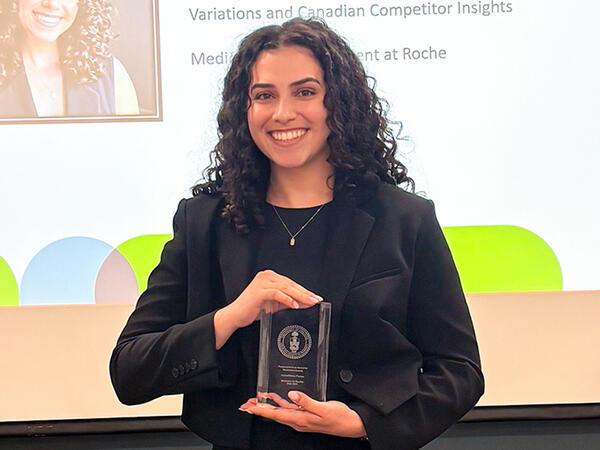Alison Thompson’s media expert and provincial advisory roles contribute to public discussions about challenging topics during COVID-19 pandemic
Science advisory tables and public health experts have been crucial in providing evidence to the government and public to help guide the COVID-19 pandemic response. At the same time, experts in bioethics have also been important voices, engaging the public and decision-makers in challenging conversations about the ethical aspects of these policy decisions. Their expertise has been particularly important in an ever-changing situation in which the science has not always provided clear answers about the best course of action.
“We tend to think of science and ethics as separate issues, but values can’t really be separated in this kind of situation,” says Alison Thompson, associate professor at the Leslie Dan Faculty of Pharmacy.
“When there is a lot of uncertainty about the science, ethics becomes really important.”
Throughout the pandemic, Thompson has been a frequent expert voice in the media and has participated in a provincial bioethics advisory group. With a research program focused on ethics related to public health, pandemic planning and public engagement in health policy, she has a unique set of expertise for the moment.
These additional roles were time-consuming and often challenging, but Thompson also found them to be valuable learning opportunities and a way to contribute to the pandemic response at a time when it was easy to feel helpless.
“It was rewarding to feel like I was actually doing something, especially during those times when we were in lockdown and felt frustrated about not being able to help,” she says. “It was one way to feel like I was contributing to the response.”
Media interviews are important way to shape public conversation
Thompson is an internationally recognized expert in pandemic ethics, and over her career she has worked with the World Health Organization on guidance for communication during outbreaks and with various levels of government to develop pandemic plans and address the ethical issues that may arise.
As COVID-19 dominated the headlines for most of the last 18 months, Thompson was often called on by journalists to comment on the ethical aspects of a wide range of issues, including patient care, vaccine distribution in Canada and globally, vaccine passports and many others.
She wrote op-eds for national outlets and did more than 150 interviews for both print and broadcast media. She also had long background conversations with journalists to help them think through the complex topics they were covering. Thompson says that she was averaging several hours every week on this voluntary media work, but that it was well worth the time commitment.
“When you have a lot of voices weighing in, it’s really important for the people who have some expertise in thinking through the complex issues that a pandemic raises to shape some of the public conversation,” she says. “It’s really about making sure that those ethical conversations are happening in the public space and actually engaging people.”
For example, in recent months as governments across the country have deliberated if and how to implement a vaccine passport, Thompson has been interviewed a number of times about the ethical issues that should be considered in such a decision, when clear scientific evidence is not yet available, including ensuring equitable vaccine access in marginalized communities and the right to privacy.
Thompson says that it is challenging to be seen as a trustworthy policymaker during a pandemic when the science is always changing, but being transparent about the scientific and ethical considerations behind decisions can help to build trust and engage the public.
“Public engagement and conversation around health issues are really important in a democracy,” she says. “Ultimately, ethics is about trying to come to a consensus about the right thing to do, and when the science is uncertain, a lot of policy decisions will be made based on values. Talking about these issues has helped people become more aware of this and start to have these important conversations.”
Advisory table provided ethical guidance to government
Thompson also volunteered as a member of the Ontario COVID-19 Bioethics Table, an advisory group established by the Ministry of Health and Ontario Health. The table included experts from institutions across the province to provide government officials with advice and guidance on ethical issues to help with decision-making.
The table drafted briefs that provided ethical frameworks for making policy decisions on topics ranging from drug shortages to vaccine distribution to paid sick days. Thompson and the other members of the table relied on research on pandemic preparedness, social determinants of health, and previous outbreaks, such as the SARS and H1N1 flu outbreaks, to help inform their recommendations.
While the table’s recommendations weren’t always incorporated into government policy, and there were many lessons to be learned about how to run such a table and conduct research in real time, having an advisory group focused solely on ethics helped increase the field’s visibility among decision-makers.
“It really was a really remarkable opportunity to provide advice like that,” says Thompson. “It’s rare to have a formal bioethics table advise a provincial response, so that was a significant milestone for the bioethics community.”
More News
Image

Faces of PharmSci: Kristy Scarfone
Co-supervised by Professor Jillian Kohler and Assistant Professor Jaris Swidrovich, MSc student Kristy Scarfone is researching how unregulated substance-related care and harm reduction vary across Ontario, with the goal of strengthening public health and showcasing pharmacists’ impact in this area.
Read More
Image

Research team aims to co-design diabetes and dementia support programs that meet community needs
Network for Health Populations funding will support collaborative project to improve health outcomes for immigrant communities in Mississauga.
Read More
Image

Pharmaceutical industry resident finds growth in new challenges
Pharmaceutical Industry Residency Program Award recipient AnnaMaria Passas gained new skills through residency and research project to improve marketability in industry.
Read More
